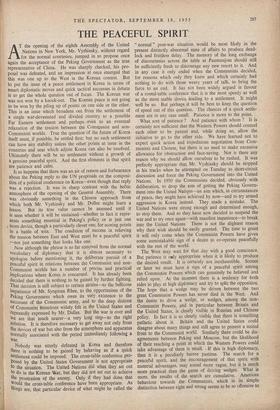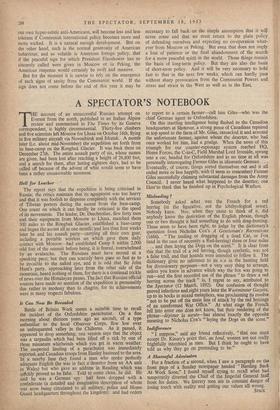THE PEACEFUL SPIRIT
T the opening of the eighth Assembly of the United Nations in New York, Mr. Vyshinsky, without regard for the normal courtesies, jumped in to propose once again the acceptance of the Peking Government as the true representative of China. He was sharply checked, his pro- posal was defeated, and an impression at once emerged that this was one up to the West in the Korean contest. But to put the issue of a peace settlement in Korea in terms of smart diplomatic moves and quick tactical successes in debate is to get the whole question out of focus. The Korean war was not won by a knock-out. The Korean peace is not going to be won by the piling up of points on one side or the other. This is an issue which broadens out from the settlement of a single war-devastated and divided country to a possible Far Eastern settlement and perhaps - even to an eventual relaxation of the tension between the Comn;ainist and non- Communist worlds. True the question of the future of Korea itself must, if possible, be settled first; but no such settlement can have any stability unless the other points at issue in the countries and seas which adjoin Korea can also be resolved. Ultimately there will be no settlement without a growth of a genuine peaceful spirit. And the first elements in that spirit are patience and calm.
It so happens that there was an air of reason and forbearance about the Peking reply to the UN proposals on the coMposi- tiOn of a political conference on Korea—even though that reply was a rejection. It was. in sharp contrast with the hectic atmosphere of the opening of the General Assembly. There was obviously something in the Chinese approach from which both Mr. Vyshinsky and Mr. Dulles might learn a lesson. But its true value cannot be assessed until it is seen whether it will be sustained—whether in fact it repre- sents something essential in Peking's policy or is just one more device, though a particularly clever one, for scoring points in a battle of wits. The condition of success in relieving the tension between East and West must be a peaceful spirit —not just something that looks like one.
Now although the phrase is so far removed from the normal vocabulary of diplomacy that it is almost necessary to apologise before mentioning it, the deliberate pursuit of a peaceful spirit in relations between the Communist and non- Communist worlds has a number of precise and practical implications where Korea is concerned. It has already been decided that there is nothing to be gained by further fighting. That decision is still subject to certain strains—to the bellicose impatience of Mr. Syngman Rhee, to the opportunism of the Peking Government which owes its very existence to the successes of the Communist army, and to the deep distrust of Communist intentions widely felt in the United States and repeatedly expressed by Mr. Dulles. But the war is over and we. are that much nearer—a very long step—to the right solution. It is therefore necessary to get away not only from the devices of war but also from the atmosphere and apparatus formally associated with the period immediately following a War.
Nobody was utterly defeated in Korea and therefore there is nothing to be gained by behaving as if a quick settlement could be imposed. The cross-table conference pro- Posed by the United States Government is not appropriate to the situation. The United Nations did what they set out to do in the Korean War, but they did not set out to achieve the prostration of the enemy. Only if they had done that _Would the cross-table conference have been appropriate. As things are, that particular device of what might be called the " normal " post-war situation would be most likely in the present distinctly abnormal state of affairs to produce dead- lock and fruitless delay. The memory of the long exchange of discourtesies across the table at Panmunjom should still be sufficiently fresh to discourage any new resort to it. And in any case it only ended when the Communists decided, for reasons which only they knew and which certainly had nothing to do with those weary years of talk, to bring the farce to an end. It has not been widely argued in favour of a round-table conference that it is the most speedy as well as the most stable device leading to a settlement. It might well be so. But perhaps it will be best to keep the question of speed out of this question. The chances of a quick settle- ment are in any case small. Patience is more to the point.
What sort of patience ? And patience with whom ? It is certainly not sufficient that the Western Powers should counsel each other to be patient and, while doing so, allow the initiative to go to the other side. We have learned not to expect quick action and expeditious negotiation from Com- munists and Chinese, but there is no need to make excessive allowance for obstruction and face-saving. Nor is there any reason why we should allow ourselves to be rushed. It was perfectly appropriate that Mr. Vyshinsky should be stopped in his tracks when he attempted on Tuesday to short-circuit discussion and force the Peking Government into the United Nations. In 1950 the Communists decided, obviously with deliberation, to drop the aim of getting the Peking Govern- ment into the United Natiqns—an aim which, in circumstances of peace; they might have achieved by now—and to try armed aggression in Korea instead. They made a mistake. The United Nations were strong enough and determined enough, to stop them. And so they have now decided to suspend the war and to try once again—with manifest impatience—to break into the United Nations. There is not the slightest reason why their wish should be easily granted. The time to grant it will only come when the Communist Powers have given some unmistakable sign of a desire to co-operate peacefully with the rest of the world.
The West may wait for that day with a good conscience. But patience is only appropriate when it is likely to produce the desired result. It is certainly not inexhaustible. Sooner or later we must have a sign of a peaceful spirit among the Communist Powers which can genuinely be believed and relied upon. At the moment there is a tendency for both sides to play at high diplomacy and try to split the opposition. The hope that a wedge may be driven between the two great Communist Powers has never died in the West. And the desire to drive a wedge, or wedges, among the non- Communist Powers, and in particular between Britain and the United States, is clearly visible in Russian and Chinese policy. In fact it is so clearly visible that there is something pathetic about it. Britain and the United States could disagree about many things and still agree to present a united front to the Communist world. Similarly there could be dis- agreements between Peking and Moscow, but the likelihood of their reaching a point at which the Western Powers could take advantage of them is small. If this is high diplomacy, then it is a peculiarly barren pastime. The search for a peaceful spirit, and the encouragement of that spirit with material advantages, may sound more vague, but it is much more practical than the game of driving wedges. What is more, the results of the search are cumulative. American behaviour towards the Communists, which in its simple distinction between right and wrong seems to be so offensive to our own hyper-subtle anti-Americans, will become less and less tolerant if Communist international policy becomes more and more wicked. It is a natural enough development. But on the other hand, such is the normal generosity of American behaviour, and so volatile is American foreign policy, that if the peaceful sign for which President Eisenhower has so sincerely called were given in Moscow or in Peking, the American response would certainly be swift and massive.
But for the moment it is unwise to rely on the emergence of such signs of sanity from the Communist world. If the sign does not come before the end of this year it may be necessary to fall back on the simple assumption that it will never come and that we must return to the plain policy of defending ourselves and expecting no co-operation what- ever from Moscow or Peking. But even that does not imply a loss of patience or the final abandonment of the search for a more peaceful spirit in the world. Those things remain the basis of long-term policy. But they are also the basis of short-term policy. And it will be very necessary to hold fast to that in the next few weeks, which can hardly pass without sharp provocation from the Communist Powers and stress and strain in the West as well as in the East.



































 Previous page
Previous page